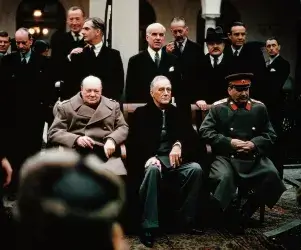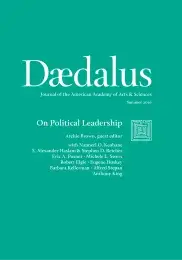
Leadership, Equality & Democracy
Democracy is rooted in the idea of political equality, but wealth inevitably dictates that some citizens are “more equal” than others. Thus, profound and worsening socioeconomic inequalities pose a fundamental threat to Western democratic governance. In this essay, Nannerl Keohane argues that only passionate and pragmatic leadership—found with presidents and heads of government but also with congressional committees, local politics, and education—can overcome the dangers of a polity in which the power of money so exceeds the will of the people as effectively to veto social change.
Rethinking the Psychology of Leadership: From Personal Identity to Social Identity
Effective leadership is the capacity to mobilize a mass constituency to bring about shared goals. But the same qualities that make one leader effective may render another useless. Using a social identity approach, psychologists S. Alexander Haslam and Stephen D. Reicher explore leadership as an influence process built on an internalized sense of group membership shared between leaders and followers. Successful leaders not only represent and mirror their followers, but actively create, advance, and embed this identity in pursuit of their goals.
Presidential Leadership & the Separation of Powers
The U.S. presidents judged the “greatest” leaders by historians and pundits are also the most heavily criticized by legal scholars. These presidents overcame the barriers erected by Madison’s separation of powers and breached the constitutional norms they swore to uphold. What then stops presidents from abusing their powers? Eric Posner points to the multifaceted nature of presidential leadership: the president is at once leader of the country, a party, and the executive branch. The conflicts between these interests constrain his or her power.
Women & Legislative Leadership in the U.S. Congress: Representing Women’s Interests in Partisan Times
Women are drastically underrepresented in American political institutions. This has prompted speculation about the impact of electing more women on policy and the functioning of government. Examining the growing presence of women in Congress, Michele Swers demonstrates that women exhibit unique policy priorities, focusing more on the needs of various groups of women. However, the incentive structure of the American electoral system, which rewards ideological purity, means that women are not likely to bring more consensus to Washington.
Varieties of Presidentialism & of Leadership Outcomes
What is the relationship between institutional power and political leadership? What is the effect of presidential institutions on political, economic, and social outcomes? Robert Elgie examines the protracted debate among political scientists about whether a parliamentary or presidential system is more conducive to the transition to democracy, and argues that any approach to studying institutional power must account for the quality and style of specific political leaderships and the interactions between institutions, leaders, and contexts.
Authoritarian Leadership in the Post-Communist World
Several of the successor states to the Soviet Union have seen the emergence of monstrous cults of personality; in a number of cases, their presidents wield even more individual power than that of party leaders in the post-Stalin Soviet era. Eugene Huskey explores the origins and development of personalistic rule in these states, finding significant variation among the approaches leaders have used to consolidate power and outline a post-Soviet future.
Leadership–It’s a System, Not a Person!
Highlighting the absurdity of what she calls the “leadership industry,” Barbara Kellerman suggests that “we do not have much better an idea of how to grow good leaders, or of how to stop or at least slow bad leaders, than we did one hundred or even one thousand years ago.” Kellerman questions the overwhelming importance of individual leaders to begin with, looking instead to contexts and followers, and calls for the replacement of the lucrative but vapid industry surrounding leadership training and education.
Multiple but Complementary, Not Conflictual, Leaderships: The Tunisian Democratic Transition in Comparative Perspective
While democracy has spectacularly failed to take root in Egypt, Syria, and Libya, an impressive but still fragile democracy has emerged in post–Arab Spring Tunisia. Alfred Stepan notes a commonality with the transitions that produced effective democratic leadership in Indonesia, Spain, and Chile; like those nations, Tunisia has had a multiplicity of cooperating leaders, rather than a single “strong leader” or multiple conflictual leaderships. This case study outlines key features of the Tunisian transition.
Against the Führerprinzip: For Collective Leadership
The yearning for a strong individual leader who will dominate all and sundry is the pursuit of a false god. Yet the craving for a “strong leader” still persists, and is a major factor in the 2016 U.S. presidential election. In his essay, Archie Brown highlights the ineffectiveness and dangerousness of powerful individual leaders. He argues that since no leader in a democracy was ever elected because he or she was believed to have a monopoly of wisdom, it defies both common sense and democratic values for other members of the leadership team to subordinate their independent judgment to the perceived preferences of the person at the top.
In Favor of “Leader Proofing”
Strong leaders are by definition high-risk individuals likely to do more harm than good; the best-governed liberal democracies have actually obviated the need for them. Anthony King concludes the issue by arguing that while there may be crises necessitating the acquisition and wielding of power by a single leader, there is much to be said for a liberal democracy’s “political culture and institutions having built into them a fair amount of ‘leader proofing.’”
